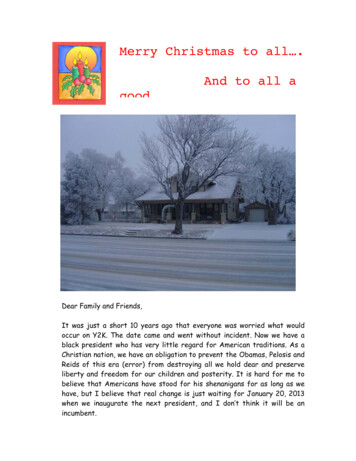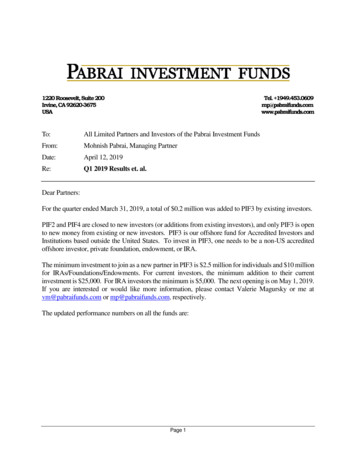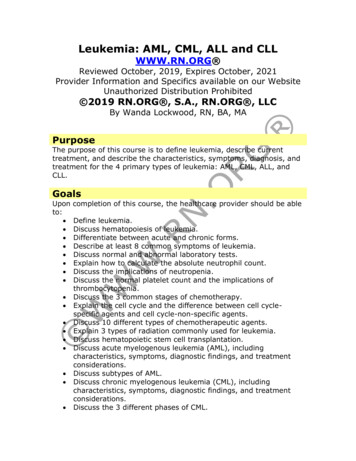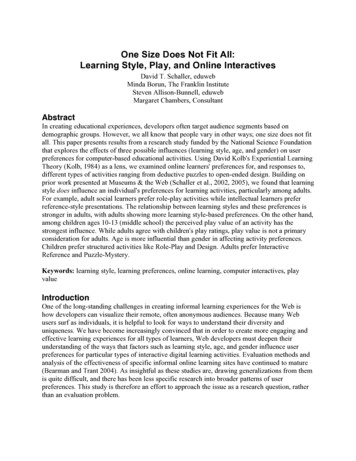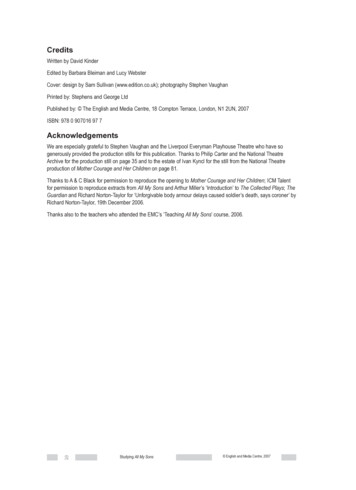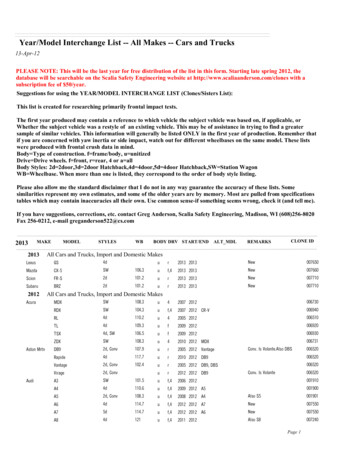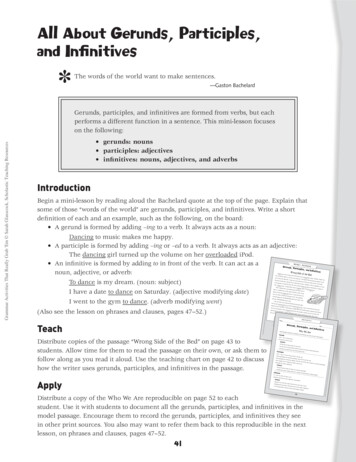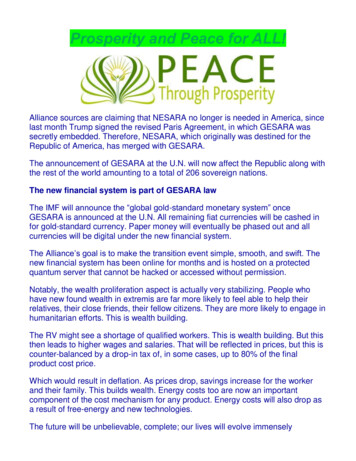
Transcription
Our StoryHow it All Began and Who Was Involved1
Our StoryPioneer of the Grocery Industry: William Thomas (W.T.) HarrisWritten in part by Beverly Tatum, granddaughter of W.T. HarrisWilliam Thomas (W.T.) Harris, co-founder of Harris Teeter, was born in 1909 and raised on a cotton farm in southern Georgia. One of 12 children, he loved his home but, at the ageof 22, decided it was time to discover what else the world had to offer. Little did the world know that this humble man with a knack for storytelling would soon revolutionize thegrocery shopping experience. W.T. left his family’s farm during the Great Depression and first ventured to Rock Hill, SC where he worked several jobs, including a big-rig truck driverand a clerk at a five-and-dime shop. He met his future wife, LaVerne, an accounting office manager, and they soon married. His childhood on a farm, experiences in trucking and retailstore work, along with a new wife with accounting expertise, set him on a path to success. After marrying, the young couple decided to move to Charlotte, NC for better jobopportunities. That’s where W.T. officially began his storied career as a grocery man and community advocate.Upon moving to Charlotte, W.T. landed his first job with an A&P grocery store. He approached the store’s management team with an offer they could not refuse.“Let me work for you for a week,” he said. “If I don’t increase your sales by 10 percent you can fire me,” he added.W.T. Harris did increase store sales and rose through the ranks to store manager. During his time at A&P, he formulated ideas about how he believed the groceryindustry could be better run – cleaner stores, wider aisles, friendly and knowledgeable associates and brand names at lower prices. After two years, and with aplan in mind, W.T. decided to go into business for himself. Impressed with his business plan, First Union bank agreed to loan him 500 to open his first store.Even though the country was still going through the Great Depression, 1936 was a big year for the Harris family. LaVerne and W.T. had their second child –a baby boy named Donald Thomas – and W.T. opened his first store on Central Avenue. The store was founded on three principles: high-quality products, cleanstores and superior customer service.If he talked about the business to his family, it was always about customer service. He founded hisbusiness on the value of customer service. His vision was to be the best in customer service and to offer thebest quality products.1936NewspaperAdsfromHarris TeeterarchivesBeverly Tatum, W.T.‘s granddaughterAccording to his granddaughter, W.T. would inspect all of the fruit and produce purchased for his stores. He had a first-hand and in-depthknowledge of produce, which often came in handy when dealing with farmers. A pecan farmer once tried to trick W.T. into buying his Schleypecans, a very expensive variety grown in southern Georgia. W.T. happened to know exactly what a Schley pecan should look like and calmlytold the farmer that he knew that those pecans were not Schley but another variety. W.T. would buy a handful of pecans from this shockedgentleman but not at the high price the farmer asked. His knowledge saved him from an unsavory salesman.Focusing on freshness, in peach season, W.T. would drive into South Carolina to bring back bushels of peaches for the stores. He even sold freshflowers from his mother-in-law’s garden, giving her the profits from the flowers. He made arrangements with corn growers and others toalways bring in the best local products. After two years at the original Harris Food Store Central Avenue location, Harris built and moved downthe road to a larger building that is now known as Store #201 where he continued to find ways to differentiate himself from the competition. Store#201 was not only the first full self-service supermarket in Charlotte, it was also the first air-conditioned grocery store and was the first to stay openuntil 9pm on Friday nights. This allowed working men and women to grocery shop in the evenings. Sales soared as people could come by aftergetting their weekly paychecks and buy groceries. Later, he expanded the store to include a full-service drugstore called Harris Drugs.In later years, he sold these drugstores to Mr. Eckerd, and they became Eckerd drugstores.The first Harris Food Store on Central Avenue in 1936. Left to Right: Fred Metler, Paul McIntosh and W.T. Harrisphoto provided by Beverly Tatum2
Having not graduated from high school, W.T. realized the value of quality education. From 1957 until histhe customers, and Vernedale ice cream was everyone’s favorite. Always wanting to stay busy, W.T. bought adeath, he was on the Board of Directors for Wingate College, often giving the commencement speech andclothing store in Charlotte called Ledford’s.proudly handing out the diplomas. He encouraged young people to stay in school and to get a collegeAccording to Tatum, her grandfather had a strong passion for selling, but initially did not understand theeducation. He helped many through scholarships he funded. He was instrumental in the growth andclothing business model. W.T. thought he could apply his food industry sales skills to the clothing market,expansion of degrees at Wingate, which earned university status and is now Wingate University. He wasbut people do not buy clothes every day like they do groceries. He eventually learned the clothing business,recognized by Wingate in the 1980s with an Honorary Doctorate degree which he accepted with great lovedid all the clothes buying at market, and became quite a snappy dresser. He really just loved being back outand appreciation.with customers again.Through the urging of his daughter, Phyllis, an innovator in early childhood education, he worked with thenDespite his busy professional schedule, Harris always had time for his business, his church and hisGovernor Scott to have kindergarten made a permanent program in every North Carolina elementary school.community. He was president of the Greater Charlotte Chamber of Commerce in 1966 and led theW.T. traveled the state persuading county leaders of the need and benefits of kindergarten. It was an especiallyMecklenburg Board of County Commissioners. As head of the Charlotte Chamber, he conceived the idea ofhard sell because the kindergarten program was to be funded with the first-ever cigarette tax in the tobaccodeveloping University Research Park, believing that a combination of education and technology would bringstate. W.T. was in the gallery of the NC State Legislature the day public kindergarten was passed into law andadditional jobs to Charlotte. He was thus considered the “father” of University Research Park, and the citycould not have been prouder.honored him by naming the main road through the research park for him, W.T. Harris Boulevard.While W.T. was busy making a name for himself in Charlotte, not too far away, another grocery man with asimilar business philosophy, Willis Teeter, was also making strides in the industry. When W.T. and Willis Teetermet, W.T. was mapping out ways in which he could afford to purchase a warehouse distribution center to storegroceries. Teeter liked what he heard, and in 1958, the two men purchased a warehouse to leverage buyingHarris Teeter was a business begun by a man of principles and still is a companythat lives by those principles.Beverly Tatum, W.T.‘s granddaughterpower for both of their companies.“If we happened to be with Grandpa and drive past the road, the family would tease him that the city namedHarris Super Markets and Teeter Super Markets formally merged in 1960, remaining a family-owned companya dirt road after him,” said Tatum. “Grandpa had a great sense of humor and took it all in stride. Now look atfor nearly one decade. Members of both the Harris and Teeter families were employed as store managers,that road today!”accountants and buyers. W.T. Harris’s son, Don, was an integral part of the company’s growth. Don launchedW.T. Harris passed away on November 14, 1989, at the age of 80, but his love for the grocery industry wasHarris Teeter’s Health and Beauty Care (HBC) department and introduced Revlon and Hallmark to the groceryevident until the day he died. W.T. often stopped by the Cotswold Village Harris Teeter in Charlotte to bagindustry. He allowed customers a one-stop shopping experience. “We knew that, if on a Sunday, he (Don) saidgroceries and visit with associates and customers alike. Most customers never knew the older man bagging‘Let’s go for a ride,’ it meant we would be visiting drugstores all day,” said Beverly Harris, W.T.’s daughter-in-law.their groceries was the founder of the company where they shopped! W.T. never met a stranger and all thoseW.T.’s sister-in-law also played an important role in the company. “My Aunt Rubye was Grandpa’s secretary,”who were lucky enough to know him deemed W.T. an honorable man of great character and integrity whoremembered Tatum. “I always tried to sneak past her and run into Grandpa’s office to see him. I didn’t alwayslived by his beliefs and respected all people, regardless of their station in life.make it past her, but even if he was in a meeting or on the phone, he would let me sit on his lap and rummageStanding by his value system, this ‘old country boy’ from Georgia was able to lay the foundation thatthrough his desk drawers for pieces of the Juicy Fruit gum he always carried with him.”allowed a tiny, family-owned operation to grow into the 25th largest grocery store in America,In 1969, the families sold Harris Teeter to Ruddick Corporation. W.T. Harris was 60 at the time and wanted towithout sacrificing the integrity of the operation.make sure Harris Teeter was left in good hands. Although he no longer owned Harris Teeter, Harris remainedvery active in the business after the sale. He was Chairman of the Board of Directors for Harris Teeter until1972 and remained on Ruddick’s board until 1981.While Harris Teeter associates best know W.T. Harris as the co-founder of Harris Teeter, he was also involvedin many other ventures. He ran a dairy farm from 1943 to 1950 and created a co-op for the local dairymen.(One was the father of the Reverend Billy Graham.) They sold the business to PET Dairy and Harris Teetercarried PET dairy products for many years. During this time, W.T. created the first Harris Teeter store brandproducts sold under the name of “Vernedale Farms,” named for his wife LaVerne. They were quite popular withHe would be so proud if he could see howHarris Teeter is being run today.Beverly Tatum, W.T.‘s granddaughter3
Our StoryPioneer of the Grocery Industry: Willis Lee (W.L.) TeeterWritten by C. Lavette Teeter, son of Willis Lee (W.L.) TeeterWillis Lee (W.L.) Teeter was born on September 29, 1909, and raised on a rural farm in the Prospect Churchcommunity of Mooresville, NC. One of nine children, he left his family farm after graduating from high schooland went to work for Atlantic and Pacific Tea Company (A&P). Both W.L. and his brother Paul G. (Bill) workedfor A&P for many years.In 1939, W.L. saw an opportunity. The local A&P moved out of its old location on North Main Street in Mooresville toA&P circa 1940photo provided by Charlotte Observerbuild a bigger store elsewhere, and W.L. saw his chance to lease the old building and go into the grocery industry. A&P agreed to lease the building to theTeeter brothers to open their own grocery store. A&P’s regional manager predicted W.L. and Bill would not last six months running their own store and would beback seeking their old jobs at A&P.After borrowing 1,700 and stocking the store, the Teeter brothers opened the first Teeter Food Mart on July 15, 1939. It was a family-run operation, no doubt.W.L. was the manager, his brother Bill was the produce manager, and W.L.’s wife, Sylvia Teeter, worked at the store. Three other gentlemen rounded off the listof employees. The first three days’ sales were 804, and by November 1941, sales rose to 2,748 per week.The original Teeter Food Mart had a dirt basement floor and sold live chickens from a cage on the back porch.There was no credit and customers would bring in their shopping lists and clerks would get the product. HarveyMillsap, store clerk, was often seen jumping over the counter on his way to get a product for customers, and thestore offered free home-delivery services to its customers.Business continued to grow, and in 1946 the Teeters moved from downtown and across the railroad tracks to a new,larger 3,924-square-foot store at 207 South Broad Street. The new location attracted a lot of new trade and, afterstudying developments in the grocery industry, the Teeters expanded their first “big” store in Mooresville andinnovated with semi-self-help service meats and double-deck dairy cases. The Teeters were also leaders ininstalling the first automatic doors and check-outs in North Carolina. With the growth, Bill’s wife Mildred joined1957 Newspaper Ad from Teeter’s Super Marketsad provided by David Parduethe staff as a bookkeeper. The store continued to grow and underwent several remodels and enlargements.more about Mr. Teeter.the following are quotes from an HT Happenings Newsletter following W.L.’s death in 1980From the first, he maintained that the customer was themost important person. He was out to please whomever setfoot in the store.Mr. and Mrs. Teeter at a store opening in 1953.4photo from HT Happenings, September 1980Sylvia Teeter, W.L.’s wifeThis Mooresville Ice Cream Company display case,as pictured at the Teeter Food Mart in Mooresville, NC,provided the widest selection of DeLuxe Ice Cream productsavailable in 1954. The Teeters often sampled products forcustomers; Gail Lowrance offered samples of thelocally-produced ice cream to customers in Teeter Food Mart.photo provided by Cindy Jacobs, Local Historian and AuthorHe waited on the customers himself.He always worked hard. There wasnothing he would ask an employee todo that he wouldn’t do.Lorene Clodfelter, an employee of his from 1945
As the store grew, Sylvia became an instrumental part of the store operation. Sylvia set up a kitchen in her home with large marbleslabs on which she made homemade candy to sell in the store. The family also farmed peanuts, peas, sweet potatoes and otherproduce which sold in their store.In July 1953, the Teeters opened their second store in Lincolnton, NC. A large crowd of eager shoppers greeted Manager Roy Guffey andhis staff when the store opened. The crowd lined around the building and the staff had to close the store several times as they ran out ofshopping carts. They also ran out of cash register tape and finished the day listing grocery purchases on paper grocery bags. They thentotaled those purchases by hand in order to move the customers through the store.Teeter Food Mart continued to expand in North Carolina. In 1957, a third store opened in Newton, a fourth store opened in Cornelius, a fifth store opened inHickory, and a sixth store opened in Morganton in November 1958.After his sixth store opened, W.L. joined the North Carolina Food Dealers Association where he met W.T. Harris. At the time, W.T. was president of HarrisSuper Markets, a nine-store chain in Charlotte. W.T. had recently completed a new warehouse on Hawkins Street in Charlotte and he needed warehousespace; Teeter’s Super Markets had outgrown its warehouse space and, according to W.L., a merger with Harris Super Markets would “increase the financialstrength of Teeter’s Super Markets, allow it to expand more rapidly and buy more advantageously, and help save operating costs.” These factors led to a votein November 1959 to merge the nine Harris Super Markets and six Teeter stores to form Harris Teeter Super Markets.The merger became official with the opening of business on February 1, 1960. W.T. Harris was President, W.L. Teeter Executive Vice-President and Bill TeeterVice President. The new company became the largest independent grocery organization in the Carolinas. There were already 15 stores in operation. The first“Harris Teeter” store to open under the new banner was in Kannapolis, NC.Within three years after the merger, 25 stores were in operation. A new, larger warehouse with office facilities was opened. Harris Teeter further expandedits marketing area by purchasing five supermarkets from Tilman’s Grocery of Shelby, NC and two independent grocery stores, one in Charlotte and one in Gastonia.W.L. retired from Harris Teeter in 1972 and returned to the Will-Via Polled Hereford cattle farm that he started in 1938. He later served a four-year term as a directorarticle from Mooresville Tribuneprovided by John Hutchens Jr.in the National Polled Hereford Association. He had an active community service life and was a life-long member of Prospect Presbyterian Church where he served as deacon and elder.He was also active in the Mooresville Kiwanis Club where he served as President in 1965. In addition, he served as Director of Piedmont Bank in Mooresville, which later merged with First Unionand is now Wells Fargo.W.L. Teeter passed away on June 30, 1980, following a lengthy illness. People described him as “a mover and shaker who frequently did laborious work himself rather than entrusting it to others.He felt he should cash in on his own drive and energy,” and he did.He was a friend of mine whom I talked with often.I didn’t consider him a threat and he didn’t consider mea threat. We looked at ourselves as two local grocers tryingto do business against whoever was out there.W.T. Harris, commenting on his relationship with W.L. Teeterbefore they merged storesI worked for him for 32 years and never knew a betterman. I’ve seen him shell a lady’s beans for her one day,drive a truck the next. He was all business at work.Paul Harwell, an employee of Teeter’s, 1946W.L. Teeter with his brother Bill Teeter, his first and lifelong business partnerphoto from HT Happenings, September 19805
Our StoryRuddick CorporationEver wonder where the name Ruddick came from?At one point in their careers, Merton Rudisill and Rush Dickson endeavored to launch a company that marketed coin-operated vendingmachines, billiard tables and amusement machines. Merging their last names, they called the company Ruddick. Although it never tookoff and the venture was dropped, Rush kept the corporate entity and the name in preparation for future ventures.Rush Dickson founded R.S. Dickson & Company in 1919 in Gastonia, NC. He found himself with a “sizeable investment profit” from a stock sale and formed thecompany as a partnership that dealt with textile manufacturing, stock trading and initial public offerings. The company was incorporated in 1924.Heeding warnings of a collapse in the stock market, Rush “liquidated stock” in his company and was able to avoid the financial pitfalls of the Great Depression. Thefirm operated on a brokerage basis for many years. In 1942, Rush purchased the American Yarn & Processing company. Five years later, he purchased EfirdManufacturing, and in 1952, he merged the two companies to form American & Efird, Inc.*In 1958, R.S. Dickson & Company worked with W.T. Harris to help finance W.T. Harris’ purchase of a storage facility in conjunction with W.L. Teeter, owner of Teeter’s Super Markets inMooresville. Two years later, R.S. Dickson & Company financed the merger of the two grocery stores and acquired partial ownership in the new company.Rush Dickson had often talked about families falling out over business and money and did not want that to happen within his own family. He passed away in 1966 and his sons Alan and StuartDickson took over and soon organized plans to merge American & Efird with the financial businesses of R.S. Dickson & Company. From this merger grew Ruddick Corporation, a diversifiedholding company. In 1969, Ruddick Corporation purchased Harris Teeter. “Despite his feelings about families in business together, we think he would approve of
Harris Teeter’s Health and Beauty Care (HBC) department and introduced Revlon and Hallmark to the grocery industry. He allowed customers a one-stop shopping experience. “We knew that, if on a Sunday, he (Don) said ‘Let’s go for a ride,’ it meant we would be visiting drugstor

